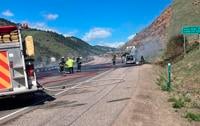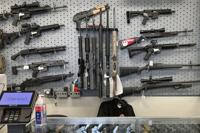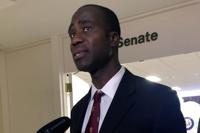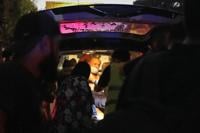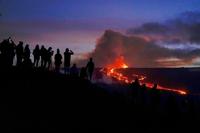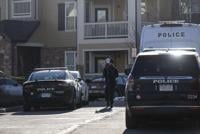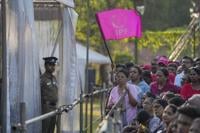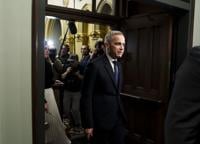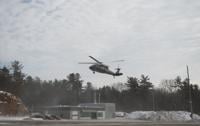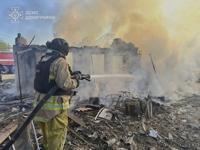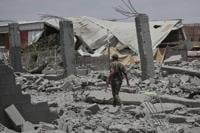Palestinians are marking 76 years of dispossession on Wednesday, commemorating their mass expulsion from what is today Israel, as a potentially larger catastrophe unfolds in Gaza where over a quarter of the population has been displaced by fighting in the last few days alone.
Israel has been pressing its military operations in Rafah, a city along Gaza's southern border with Egypt, and in northern Gaza, where . Around 600,000 Palestinians have been driven out of since the beginning of last week, a U.N. spokesperson said Wednesday. In northern Gaza, Israeli evacuation orders have displaced at least 100,000 people so far.
Some 80% of Gaza's population of 2.3 million Palestinians have fled their homes since the start of the war, with many relocating multiple times.
No food has entered the two main border crossings in southern Gaza for more than a week. Some 1.1 million Palestinians are on the brink of starvation, according to the U.N, while a is taking place in the north of the territory.
Israel has portrayed Rafah as the last Hamas stronghold, brushing off warnings from the United States and other allies that any major operation there would be catastrophic for civilians.
Seven months of the war have killed more than 35,000 people in Gaza, most of them women and children, .
The war began Oct. 7 when Hamas attacked southern Israel, killing around 1,200 people there, mostly civilians, and taking about 250 hostage. Israel says militants and the remains of more than 30 others.
Currently:
— The and ammo to Israel, congressional aides say.
— from present-day Israel, a somber “Nakba,” which is Arabic for catastrophe.
— Some to pressure them to take a stand over the crisis in Gaza.
— Israelis mark a subdued under the shadow of the war in Gaza.
— acknowledge attacking a US destroyer that shot down missile in the Red Sea.
Follow AP’s coverage of the war in Gaza at
Here's the latest:
HAMAS VOWS IT'S ‘HERE TO STAY’ AS ISRAEL AND U.S. DISAGREE OVER POSTWAR PLANS FOR GAZA
JERUSALEM — Hamas’ top leader said Wednesday that the militant group was “here to stay,” as Israel and the U.S. disagree over a vision for who will administer Gaza once the war ends.
Ismail Haniyeh’s remarks come as Israeli Prime Minister Benjamin Netanyahu has faced mounting criticism over his lack of a postwar plan for governance in Gaza. Netanyahu said Thursday that preparing for the day after the war in Gaza was impossible so long as Hamas was not defeated, which Israel has vowed to do.
Haniyeh, in a speech marking the 76th anniversary of the Palestinians’ mass expulsion from what is now Israel, appeared to be responding to the conversations about Gaza’s future.
“There was a lot of talk about the so-called day after the war,” he said. “We say that the Hamas movement is here to stay.”
Israel has reinvaded parts of northern Gaza in recent days that it had captured earlier in the war. That, along with an increase in rocket fire toward Israel, indicates Hamas is regrouping.
The U.S. has criticized Israel for not deciding on a postwar plan for Gaza.
LEBANON'S HEZBOLLAH ATTACKS ISRAELI BASE WITH DRONES, THE DEEPEST STRIKE INSIDE ISRAEL SINCE GAZA WAR BEGAN
BEIRUT — Lebanese militant group Hezbollah says it used explosive drones to attack an Israeli military base on Wednesday near the northern city of Tiberias, in what appeared to be the group's deepest strike inside Israel since the war in Gaza began seven months ago.
The Israeli military said there were no injuries from the strike, about 35 kilometers (22 miles) from the border with Lebanon.
Hezbollah said in a statement that the attack on the Ilaniya base west of Tiberias was in retaliation for Israel’s killing of Hezbollah officials a day earlier. An Israeli drone strike on a car in southern Lebanon killed a local commander and wounded two other people with him.
Since the Israel-Hamas war broke out last October, Hezbollah and Israel have traded fire across the border almost every day. Israel’s military has managed to kill a number of local Hezbollah commanders.
Hezbollah leader Hassan Nasrallah in a speech Monday reiterated his group’s stance that it would keep up its strikes until Israel ends the war in Gaza.
Israeli airstrikes and shelling, mainly in southern Lebanon, have killed nearly 400 people, most of them militants, but also more than 70 civilians and noncombatants. In Israel, the violence has left at least 15 soldiers and 10 civilians dead.
COMBAT ESCALATES IN GAZA CITY BETWEEN HAMAS AND ISRAELI MILITARY
JERUSALEM — Battles between Hamas militants and Israeli forces intensified across different areas of Gaza City, Palestinian rescue workers and the Israeli military said Wednesday.
The increased violence in northern Gaza is part of a resurgence in fighting in parts of the beleaguered territory that the Israeli military said it had asserted control over months ago.
An escalation in gunbattles and Israeli strikes have been seen in a number of districts across the city, including the Jabaliya urban refugee camp and the southern Zeitoun area.
The Palestinian Civil Defense, an emergency group active in Gaza, said Wednesday it recovered dozens of bodies in the Zeitoun and the al-Sabra area from the recent fighting.
In Jabaliya, northeast of the city center, an Israeli strike hit a residential building, killing five people, the emergency group said.
A tall plume of smoke and debris rose from the site of the strike. Associated Press journalists saw residents and rescue teams searching for survivors beneath the rubble, while others carried survivors from the wreckage.
The increased fighting in areas where Israel said it had gained control suggests that Hamas is regrouping, more than seven months after the war erupted. There also has been an increase in rockets fired from Gaza toward Israel in recent days.
U.N. SAYS 600,000 PEOPLE DISPLACED FROM RAFAH BY ISRAELI OPERATIONS — A QUARTER OF GAZA'S POPULATION
UNITED NATIONS — The United Nations says some 600,000 people have been displaced by Israel’s offensive in the southern Gaza city of Rafah and around 100,000 others fled fighting in the territory’s north.
U.N. deputy spokesman Farhan Haq said the U.N. agency helping Palestinian refugees, known as UNRWA, reported that as of Wednesday “some 600,000 people – a quarter of Gaza’s population – have been displaced from Rafah since May 6 as the Israeli ground operation there continues.”
In addition to Rafah, he said U.N. humanitarian officials report that “ground incursions and heavy fighting also continue to be reported in Deir al-Balah in central Gaza as well as in Jabaliya in northern Gaza.”
Rafah had been packed with some 1.2 million Palestinians seeking safety from Israel’s offensive.
Haq reiterated that the U.N. contends “there’s no safe place for them to go to” in Gaza.
“Regardless of whether they move or stay, civilians in Gaza must be protected” under international humanitarian law, Haq stressed. “This also means civilians’ essential needs – including food, shelter, water and health – must be met, wherever they are.”
He said there is no running water, electricity of basic services at Muwasi, a rural area on the coast neighboring Rafah, that Israel has called a safe area.
Very little aid and almost no fuel is getting into Gaza, he said.
The Eretz crossing with Israel has been closed since May 9 and while the Kerem Shalom crossing is technically open, “it’s not logistically viable and it’s not safe to access,” the U.N. spokesman said.
Some commodities have entered Gaza through a new opening at Zikim in the northwest, Haq said. But fighting in Rafah has made deliveries through the southern border crossing difficult, he said, and fuel imports have stopped since the Israeli operation began, “with only some limited exceptions.”
“Access to critical health services in Gaza continues to shrink as additional evacuation orders are issued and military operations intensify,” Haq said.
As of Wednesday, he said the U.N.’s partners report that the Indonesian Field Hospital in Rafah is out of service.
That leaves eight functioning field hospitals, including one just established by the International Committee of the Red Cross in coordination with the Palestine Red Crescent Society, “to help address the overwhelming scale of needs in Rafah,” Haq said.
SHIP WITH BRITISH AID FOR GAZA DEPARTS CYPRUS
LONDON — The British government says the first shipload of U.K. aid left Cyprus on Wednesday bound for a U.S.-built temporary pier in Gaza.
The Foreign Office said the ship is carrying almost 100 tonnes (tons) of U.K. aid, including 8,400 temporary shelters made of plastic sheeting. It’s the first part of a 2 million pound ($2.5 million) package of U.K. aid to be delivered from Cyprus.
Prime Minister Rishi Sunak said the shipment was “an important moment” in increasing the flow of aid to Gaza.
“But we know that more is required, particularly via land, which is why alongside intensive work to get hostages out of Gaza we will continue efforts to unlock more routes to get vital aid in – helping people in desperate need.” Sunak said.
Britain urged Israel to meet its commitment to allow at least 500 aid trucks a day to cross into Gaza and to open the Israeli port of Ashdod to maritime shipments.
ISRAELI TROOPS KILL A PALESTINIAN MAN IN THE WEST BANK, HEALTH OFFICIALS SAY
JERUSALEM — The Palestinian Health Ministry said Israeli troops killed a man in the Israeli-occupied West Bank on Wednesday, the latest in a surge of deadly violence in the territory.
The Israeli military said a Palestinian was shot after throwing a brick at soldiers during a violent protest near the West Bank city of Ramallah.
Wafa, the official Palestinian news agency, identified the slain man as 21-year-old Mohamed Safi.
Violence has spiked across the West Bank since the Israel's war in Gaza erupted last October. Since then, around 500 Palestinians have been shot dead by Israeli forces, according to figures from the Palestinian Health Ministry.
Many have been killed in armed clashes or for throwing stones, but people not involved in confrontations have also been killed.
ISRAEL'S DEFENSE MINISTER SAYS NETANYAHU SHOULDN'T SEEK OPEN-ENDED MILITARY RULE OVER GAZA
JERUSALEM — Israel’s defense minister on Wednesday warned Prime Minister Benjamin Netanyahu against perpetuating Israeli rule over Gaza, calling him to find an alternative Palestinian leadership to replace Hamas.
Defense Minister Yoav Gallant said he had repeatedly pleaded with the government to make a decision on a postwar vision for Gaza that would see the creation of a new Palestinian civilian leadership for the territory, but that it has refused to discuss the issue.
“I call on the prime minister Benjamin Netanyahu to make a decision and declare that Israel will not rule over civilian affairs in Gaza, there won’t be Israeli military rule in Gaza, and an alternative leadership to Hamas in the Gaza Strip will be advanced,” he said.
In a nationally televised statement, Gallant urged Netanyahu to agree to such a postwar vision for the country’s best interest. He suggested Netanyahu was not making a decision out of political considerations. Netanyahu’s ultranationalist governing partners want Israel to reoccupy the Gaza Strip.
The United States, Israel's top ally, says it won’t accept a return of Israeli military occupation of the Gaza Strip.
U.S. DEVELOPMENT AGENCY OFFICIAL SAYS ISRAEL NEEDS TO STOP KILLING AID WORKERS IN GAZA
DUBAI, United Arab Emirates — An official with the U.S. Agency for International Development directly criticized the Israeli military for episodes in which its forces killed aid workers trying to bring needed food, water and medicine to people in Gaza.
Response Director Dan Dieckhaus of USAID referenced the Israeli military’s efforts at trying to avoid shooting at aid workers, part of a wider military strategy known as “deconfliction” in combat zones, as “failures.” He particularly referenced the strikes that killed workers with the World Central Kitchen program.
“Deconfliction failures, as was represented by the World Central Kitchen strike, need to stop,” he said. “They need to end. They don’t just need to be mitigated.”
He added: “We’re not at all satisfied with where they’re at now.”
The Israeli military, in response to Dieckhaus’ comments, told The Associated Press that it takes “extensive efforts” to avoid civilian casualties.
“Given the ongoing exchanges of fire, remaining in an active combat zone has inherent risks,” the Israeli military said. We “will continue to counter threats while persisting to mitigate harm to civilians.”
Speaking on a call with journalists organized by the State Department, both Dieckhaus and U.S. Navy Vice Adm. Brad Cooper said a planned operation would be working “in the coming days,” without elaborating. Dieckhaus said the U.N. and other aid agencies had not requested armed escorts for moving their aid through the Gaza Strip after being unloaded.
Pressed specifically on what the Israelis could do better, Dieckhaus said: “I don’t think USAID is privy to the targeting practices of the IDF.”
“I think overall we are we are still not satisfied and we won’t be satisfied as long as we continue to see aid worker deaths and injuries,” he said. “So that is maybe that’s a high bar. I think we would consider that a low bar that these workers are able to operate safely and securely without exception.”
ISRAEL'S NETANYAHU SAYS THERE'S NO WAY TO PREPARE A POSTWAR VISION FOR GAZA UNTIL AFTER THE WAR IS OVER
JERUSALEM — Israeli Prime Minister Benjamin Netanyahu said Wednesday there was no way to prepare for a postwar vision for Gaza until Hamas is defeated militarily.
Netanyahu appeared to be fending off criticism that he is allowing Hamas to regroup and squandering Israeli military gains in the Gaza Strip by not deciding on a plan for the embattled territory once the war is over.
Netanyahu has faced increased criticism both domestically and from the U.S., Israel’s top ally, over its postwar vision for Gaza. In a pair of interviews this week, U.S. Secretary of State Antony Blinken said the Biden administration hadn’t yet seen Israel’s plans for governance and rebuilding in Gaza, saying it expected to see such a plan.
In a statement from his office, Netanyahu said Israel had tried to enlist local Palestinians to assist with food distribution but the effort failed because Hamas threatened them, a claim that could not be verified. He said Israel was engaged in other attempts to implement a postwar reality in Gaza that he did not describe.
“While Hamas remains intact, talk of ‘the day after’ will remain just talk, devoid of content,” he said. Israeli forces are fighting in parts of Gaza, including the decimated north, that the military said had been cleared by ground troops earlier in the war.
Netanyahu has said Israel will maintain open-ended security control of the Gaza Strip. The U.S. says it won’t accept a return of Israeli military occupation of the Gaza Strip.
The U.S., as a precursor to creating a , has called for a political roadmap that includes a return to Gaza of the internationally recognized which Hamas ousted from Gaza in 2007.
Netanyahu and his right-wing government reject a role in Gaza for the Palestinian Authority, and say they will never allow a Palestinian state.
The world hasn’t seen anything like the unprecedented in Gaza since World War II, and it would take at least until 2040 to restore the homes devastated in Israel’s bombing and ground offensive if the conflict ended today, the United Nations reported earlier this month.
TURKEY'S ERDOGAN MARKS PALESTINIAN NAKBA WITH A PLEDGE TO CONTINUE SUPPORTING HAMAS
ANKARA, Turkey — Turkish President Recep Tayyip Erdogan on Wednesday commemorated the mass expulsion 76 years ago of Palestinians from what is now Israel and vowed to keep supporting Palestinians and the militant group Hamas.
Erdogan's remarks came as Palestinians across the Middle East and beyond marked the anniversary of Nakba, the Arabic for “catastrophe,” when 700,000 Palestinians fled or were driven out of what today is Israel before and during the war surrounding its creation in 1948.
In a speech to the ruling party’s lawmakers, Erdogan compared Israel’s actions to the Holocaust, and said Israeli Prime Minister Benjamin Netanyahu and other officials would “pay the price” for the attacks in the war in Gaza.
“Even Hitler did not carry out the Holocaust, which went down as dark stain in history, so openly. He wasn’t that bold,” Erdogan claimed. “Humanity will not let these murderers go free. Even if humanity lets them go, we will chase these murderers, this genocidal network of killers.”
A long-time supporter of Palestinians, Erdogan further stiffened his stance against Israel after his ruling party lost votes to a small Islamist party in the March local elections. His government has severed trade relations with Israel and is seeking to join a legal case filed by South Africa against Israel at the International Court of Justice.
The there is a “plausible risk of genocide” in Gaza — a charge Israel strongly denies.
EUROPEAN UNION WARNS ISRAEL THAT A FURTHER PUSH INTO RAFAH WOULD ‘STRAIN’ TIES
BRUSSELS — The European Union has warned Israel that if it keeps up military operations in Gaza’s southern city of Rafah, it would put a “heavy strain” on relations.
EU foreign policy chief Josep Borrell said the ongoing operation is “further disrupting the distribution of humanitarian aid in Gaza and is leading to more internal displacement, exposure to famine and human suffering.”
Hundreds of thousands of Palestinians last week in which it captured the Gaza side of the city’s crossing with Egypt. Israel says it is carrying out a limited operation after the United States and other close allies urged it to avoid a promised full-scale invasion.
Borrell said on Tuesday that “should Israel continue its military operation in Rafah, it would inevitably put a heavy strain on the EU’s relationship with Israel.”
Israel says it must go into Rafah in order to fully dismantle Hamas and return scores of hostages captured in the Oct. 7 attack that ignited the war.
Before the operation, Rafah was sheltering some 1.3 million Palestinians, most of whom had fled fighting elsewhere and were living in U.N.-run shelters and rudimentary tent camps. The United Nations says some 450,000 people have fled the city in the last week.
EGYPT SLAMS ISRAEL'S TOP DIPLOMAT FOR BLAMING THE CLOSING OF GAZA'S RAFAH CROSSING ON CAIRO
CAIRO — Egypt has blasted comments by Israel’s top diplomat in which he blamed the Arab country for the closure of the Rafah border crossing with the Gaza Strip.
Egypt has expressed mounting frustration with Israel’s last week, saying it threatens the two countries’ .
Egyptian Foreign Minister Sameh Shoukry said Israel “is responsible for the humanitarian crisis in the Gaza Strip.”
“We reject the policy of distorting the facts,” Shoukry said in a statement on Tuesday, denouncing Israel’s “desperate attempts” to blame Egypt.
He said Israel’s incursion into Rafah was the main reason aid cannot enter through the crossing and called for Israel to allow more aid through its own crossings.
Israeli Foreign Minister Israel Katz said Tuesday that there was a “need to persuade Egypt to reopen the Rafah crossing to allow the continued delivery of international humanitarian aid to Gaza.”
“The world places the responsibility for the humanitarian situation on Israel, but the key to preventing a humanitarian crisis in Gaza is now in the hands of our Egyptian friends,” Katz said.
Egypt has played a key role in mediation efforts aimed at brokering a cease-fire between Israel and Hamas and the release of hostages. It has also expressed fears that the humanitarian crisis could send across the border into its Sinai Peninsula.
ISRAELI DRONE STRIKE IN SOUTHERN LEBANON KILLS A HEZBOLLAH COMMANDER
BEIRUT — An Israeli drone strike on a car in southern Lebanon has killed a local Hezbollah commander, the militant group said Wednesday.
The Israeli military released a video of the strike along a main road near the southern port city of Tyre, saying that the Hezbollah commander had planned and carried out several attacks against Israel.
Hezbollah said 55-year-old Hussein Makki was killed late Tuesday without giving further details. Lebanon’s emergency responders said the strike also wounded two people who were taken to a hospital. They said a fire that broke out as a result of the strike was extinguished and that the body of one person was recovered at the scene.
Hezbollah said on Wednesday it fired dozens of Katyusha rockets, heavy rockets and artillery shells toward the air traffic control base on Mount Moron in Israel’s north earlier in the day in retaliation for Makki's killing.
The Israeli military said it identified 60 launches from Lebanon, “a small number” of which were intercepted. It was one of the largest barrages since the start of the war in Gaza.
Since the Israel-Hamas war broke out last October, Hezbollah has launched near-daily attacks on Israel, drawing return fire. Israel’s military has managed to kill a number of local Hezbollah commanders.
Israeli airstrikes and shelling, mainly in southern Lebanon, have killed nearly 400 people, most of them militants, but also more than 70 civilians and noncombatants. In Israel, the violence has left at least 15 soldiers and 10 civilians dead.
Hezbollah leader Hassan Nasrallah in a speech on Monday reiterated his group’s stance that it would keep up its strikes until Israel ends the war in Gaza.
U.N. AGENCY SAYS ISRAELI PROTESTERS SET FIRE TO THE PERIMETER OF ITS HEADQUARTERS IN EAST JERUSALEM
JERUSALEM — The U.N. agency for Palestinian refugees says Israeli protesters have again set fire to the perimeter of its headquarters in east Jerusalem.
Commissioner-General Philippe Lazzarini wrote on the social media platform X that “Israeli children and young people” had orchestrated an “arson attempt” on the facility on Monday night.
He shared video footage from Israeli media appearing to show small brush fires along the perimeter of the compound. Adam Bouloukos, an UNRWA official, said staff were present in the facility but no one was injured.
UNRWA spokesperson Juliette Touma said the compound had just reopened after a previous round of demonstrations outside the facility last week. Young protesters had twice set fire to the perimeter and hurled stones at UNRWA staff attempting to put out the blazes.
Touma said the compound is staying open for now.
The demonstrations began after Israel accused UNRWA, the largest provider of humanitarian aid to Gaza, of having links to Hamas and other Palestinian militants. UNRWA denies the allegations. found that the agency had “robust procedures” to ensure its neutrality but that there were some gaps in implementation.
LEADER OF HEZBOLLAH AND HAMMAS OFFICIAL VOW TO KEEP UP ATTACKS AND PRESSURE ON ISRAEL
BEIRUT — The leader of Lebanon’s militant Hezbollah group and a visiting Hamas official on Wednesday discussed the latest round of cease-fire talks but vowed to keep up attacks and pressure on Israel.
The Hezbollah-run Al-Manar TV said the militant group's leader, Hassan Nasrallah, and Hamas' Khalil al-Hayya also talked about so-called “backup fronts” — a reference to Hezbollah's attacks on Israel along the Israel-Lebanon border, as well as strikes and attacks by Yemen's Iran-backed Houthi rebels toward Israel.
The TV station said the two pledged to keep up the pressure in order “to achieve the honorable goals” set out by Hamas' unprecedented Oct. 7 attack on southern Israel that triggered the ongoing war.












